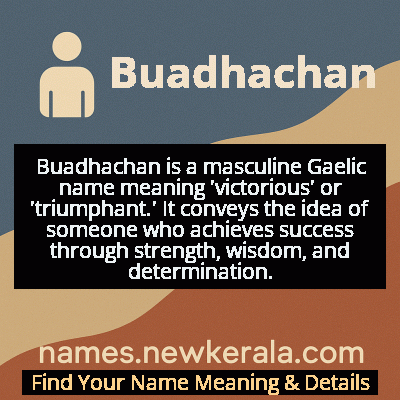Buadhachan Name Meaning & Details
Origin, Popularity, Numerology Analysis & Name Meaning of Buadhachan
Discover the origin, meaning, and cultural significance of the name BUADHACHAN. Delve into its historical roots and explore the lasting impact it has had on communities and traditions.
Name
Buadhachan
Gender
Male
Origin
Gaelic
Lucky Number
9
Meaning of the Name - Buadhachan
Buadhachan is a masculine Gaelic name meaning 'victorious' or 'triumphant.' It conveys the idea of someone who achieves success through strength, wisdom, and determination.
Buadhachan - Complete Numerology Analysis
Your Numerology Number
Based on Pythagorean Numerology System
Ruling Planet
Mars
Positive Nature
Generous, passionate, energetic, and humanitarian.
Negative Traits
Impulsive, impatient, moody, and can be overly emotional.
Lucky Colours
Red, maroon, scarlet.
Lucky Days
Tuesday.
Lucky Stones
Red coral, garnet.
Harmony Numbers
1, 2, 3, 6.
Best Suited Professions
Military, sports, philanthropy, leadership roles.
What People Like About You
Courage, energy, leadership, generosity.
Famous People Named Buadhachan
Buadhachan mac Flainn
Gaelic chieftain
Successfully defended Connacht territory against Viking invasions
Buadhachan Ó Maolconaire
Scholar and poet
Preserved Gaelic manuscripts and composed resistance poetry
Buadhachan Mac Carthaigh
Military commander
Led campaigns to maintain Gaelic independence in Munster
Name Variations & International Equivalents
Click on blue names to explore their detailed meanings. Gray names with will be available soon.
Cultural & Historical Significance
The name's cultural significance extends beyond Ireland to Scottish Gaelic communities, where it maintained similar connotations of honorable achievement. During periods of English domination, the name took on additional meaning as a symbol of cultural resistance and the hope for eventual Gaelic revival. In folklore, characters named Buadhachan often appear as heroes who overcome great odds through cleverness and moral strength rather than mere physical power, reinforcing the name's association with comprehensive victory. This multifaceted understanding of triumph makes Buadhachan a name rich with cultural heritage and philosophical depth.
Extended Personality Analysis
Individuals bearing the name Buadhachan typically exhibit a compelling combination of determination, strategic thinking, and natural leadership. Their personality is characterized by an unwavering resolve to overcome challenges, coupled with the wisdom to choose battles carefully and the patience to see long-term goals through to completion. These individuals often possess a calm confidence that inspires trust in others, making them effective leaders in both professional and personal contexts. While they are inherently competitive, their drive for victory is typically tempered by a strong moral compass and concern for fair play.
Beyond their obvious strengths in confrontation and achievement, Buadhachan's often demonstrate remarkable emotional intelligence and the ability to motivate others toward shared success. They tend to be protective of those in their care while respecting the autonomy and capabilities of others. Their victory-oriented nature extends to helping friends and family achieve their own goals, creating a supportive environment where collective success is valued alongside personal achievement. This balance of strength and compassion makes them respected figures in their communities, embodying the Gaelic ideal that true victory includes the wellbeing of one's people.
Modern Usage & Popularity
In contemporary naming practices, Buadhachan remains a distinctive choice primarily embraced by families with strong Gaelic heritage or those particularly interested in Celtic culture. While it has never achieved mainstream popularity, the name has experienced a modest revival in recent decades as part of the broader Celtic cultural renaissance. It is most commonly found in Ireland's Gaeltacht regions, Scottish Gaelic-speaking communities, and among diaspora populations in North America, Australia, and New Zealand. Modern usage often involves creative adaptations for daily convenience, with nicknames like 'Buach' or full transitions to the English equivalent 'Victor' in non-Gaelic speaking environments. The name's rarity contributes to its appeal for parents seeking a unique yet historically grounded name with a powerful, positive meaning.
Symbolic & Spiritual Meanings
Symbolically, Buadhachan represents the profound concept of victory achieved through integrity, wisdom, and perseverance. Beyond mere conquest, the name embodies the Celtic understanding of triumph as a holistic achievement that balances physical success with moral righteousness and spiritual growth. It symbolizes the journey from challenge to resolution, carrying connotations of light prevailing over darkness, knowledge overcoming ignorance, and community flourishing through collective effort. In Celtic symbolism, Buadhachan connects to natural elements like the enduring oak tree and the wise salmon - both representing the qualities necessary for meaningful victory. The name also carries metaphorical significance as a representation of cultural resilience and the enduring spirit of Gaelic tradition in the face of historical challenges.

